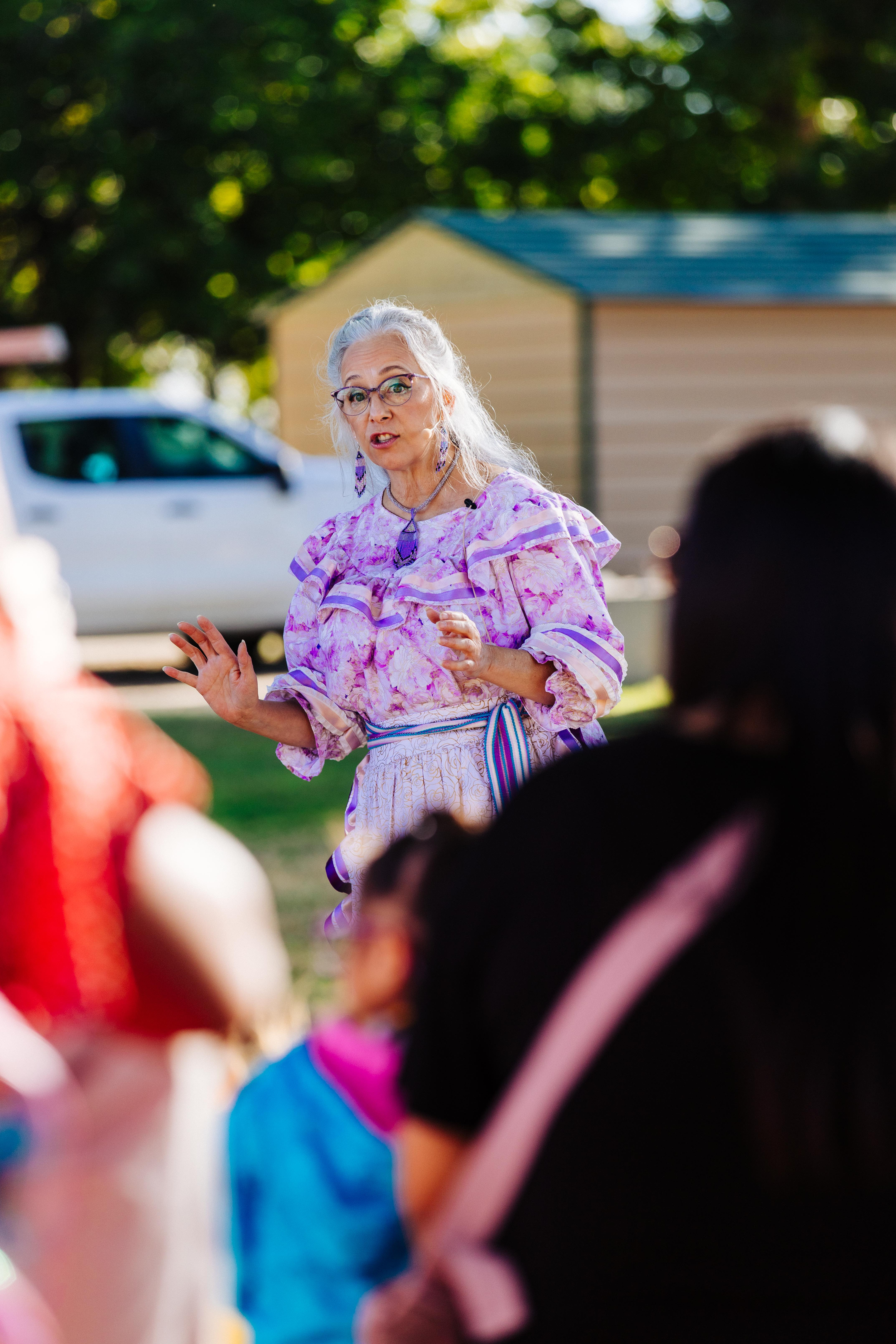
- Details
- By Chickasaw Nation Media
Chickasaws value storytelling and use it to preserve and share the vibrant culture. Morals, values, spirituality and the importance of Chickasaw history and culture are among the many aspects passed through the generations by storytellers.
“Oral storytelling and history connect us with our ancestors and the past, reminding us of the many trials and triumphs that the Chickasaw people have walked through,” Donna Courtney, storytelling program manager at the Chickasaw Nation, said.
“Stories give us a beacon to light the way into the future, grounding us in who we are and where we came from.”
To assist in keeping Chickasaw traditions, values and cultural identity thriving in the 21st century and beyond, the Chickasaw Nation has developed the Keepers of the Flame Storytelling Program.
“Our storytelling program seeks to support and enhance our cultural identity through incorporating Chikashshanompa ’ (Chickasaw language), with factual evidence incorporated into our story telling presentations , ” Courtney said.
Keepers of the Flame enables Chickasaws to pass on knowledge through traditional stories and to share Chickasaw knowledge with others throughout the world.
“At the heart of this program is the desire to preserve and perpetuate our culture, to be proud of who we are as Chickasaws, and to show the world that we are here,” Courtney said.
Chickasaw citizens study with experienced mentors to learn how to carry on the tribe’s oral storytelling tradition.
“Chickasaw stories convey many different things. They help educate the listener about the natural world, social behavior, the spiritual realm and individual responsibilities , ” Courtney said.
Through bimonthly meetings, Keepers of the Flame provides future storytellers with the opportunity to learn the necessary skills from other experienced Chickasaw storytellers. These mentors will teach the participants traditional Chickasaw stories and convey a deep understanding of Chickasaw culture. Stagecraft skills are also taught, including stage presence, how to keep audiences engaged and how to schedule performances within communities. Each meeting concludes with a question-and-answer session.
Participants must have a strong commitment to Chickasaw culture and be willing to perform at various storytelling events and concerts throughout the Chickasaw Nation and the U.S.
“Story telling presentations are held in a variety of locations with audiences from pre-K to senior citizens, including Head Start, public schools, senior centers, theatrical productions, public libraries , various Chickasaw festivals and events,” Courtney said. “Certified storytellers also attend Chickasaw citizen meetings all over the United States, Native American heritage celebrations and museums.”
The Keepers of the Flame Storytelling Program was designed through the efforts of dedicated oral historians and Chickasaw language speakers. Keepers of the Flame strive to teach a new generation of storytellers the art of recounting the values and historical narratives that shaped the Chickasaw Nation. Chickasaw citizens are invited to continue these oral storytelling traditions.
“Traditionally, an elder storyteller would choose a younger person to ‘pass the knowledge’ on to, to be a ‘Keeper of the Flame,’” Courtney said. “Today, a storyteller must have a deep love and passion for our culture, and a desire to keep these stories alive for future generations.”
Upon completion of Keepers of the Flame, storytellers will be certified by the Chickasaw Nation. Applicants must be 18 or older, be a Chickasaw citizen and be able to pass a background check.
“The Keepers of the Flame storytelling certification program is an opportunity for Chickasaw citizens to learn traditional stories and share them in creative ways with both First American and non-native audiences,” Courtney said.
For more information, visit Chickasaw.net/ Services/Culture/Storytelling or call the Chickasaw Nation Arts and Humanities Division at (580) 272-5520.
More Stories Like This
NCAI Passes Two Emergency Resolutions on Immigration Enforcement ActivitiesChickasaw Lighthorse Police Officer named Indian Country Law Enforcement Officer of the Year
Indian Gaming Association Rallies Broad Coalition Against Sports Event Contracts It Calls Illegal Threat to Tribal Sovereignty
Navajo Resources and Development Committee Issues Notice on Livestock Inspection Requirements
American Prairie, Tribal Coalition Files Protest Over Rescinded Grazing Rights
Help us defend tribal sovereignty.
At Native News Online, our mission is rooted in telling the stories that strengthen sovereignty and uplift Indigenous voices — not just at year’s end, but every single day.
Because of your generosity last year, we were able to keep our reporters on the ground in tribal communities, at national gatherings and in the halls of Congress — covering the issues that matter most to Indian Country: sovereignty, culture, education, health and economic opportunity.
That support sustained us through a tough year in 2025. Now, as we look to the year ahead, we need your help right now to ensure warrior journalism remains strong — reporting that defends tribal sovereignty, amplifies Native truth, and holds power accountable.
 The stakes couldn't be higher. Your support keeps Native voices heard, Native stories told and Native sovereignty defended.
The stakes couldn't be higher. Your support keeps Native voices heard, Native stories told and Native sovereignty defended.
Stand with Warrior Journalism today.
Levi Rickert (Potawatomi), Editor & Publisher

